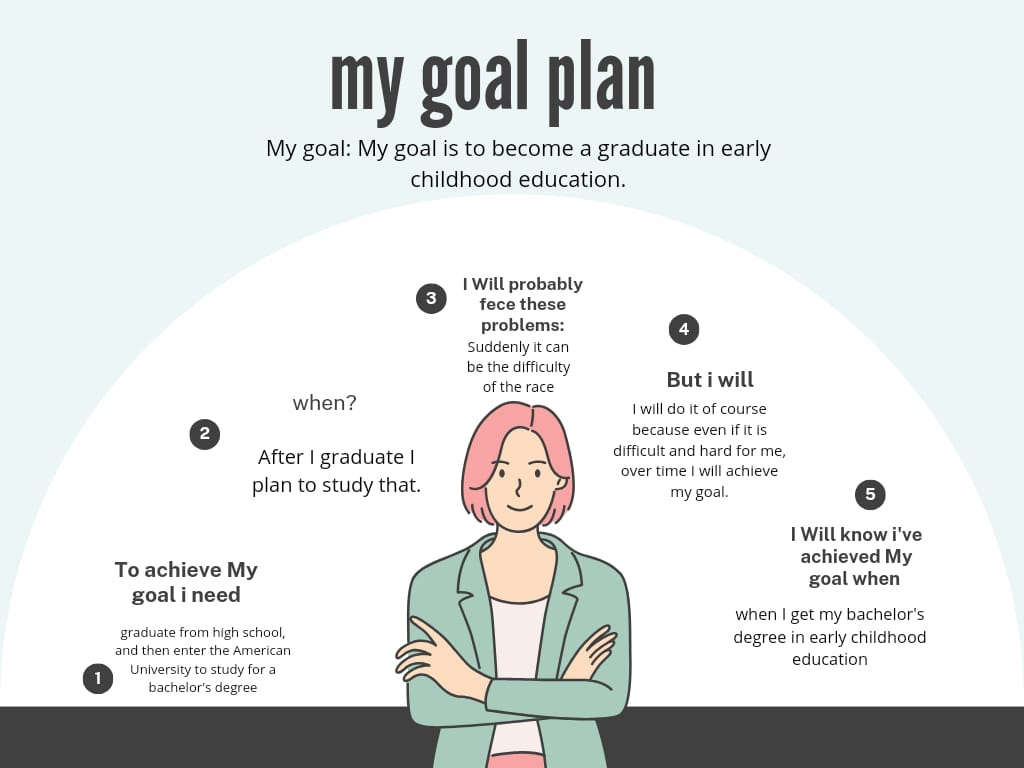Activity page 16 AND 17
The meanings of words:
1. **Goal**: A goal is a specific result that a person or group wants to achieve within a certain period of time. It is often set as an intermediate step within a larger objective. Goals can be personal, professional, educational, or health-related. They are essential in providing direction and motivation, helping people focus on what they want to achieve and measure their progress in a concrete way.
2. **Ambition**: Ambition is the strong and often intense desire to achieve a significant accomplishment, whether in the personal, professional, or academic realm. This drive can lead people to push themselves beyond their limits to get what they want, whether it is a job, recognition, financial success, or personal development. While ambition can be a driver of success, it can also lead to dissatisfaction if it is not balanced with gratitude and acceptance of the present.
3. **Short-term**: This term refers to a time frame that spans the immediate future, usually in the range of weeks to months. Short-term goals are those that can be achieved quickly and often serve as stepping stones to larger goals. These goals are important because they create a sense of immediate accomplishment and can motivate people to continue working toward more ambitious long-term goals.
4. **Long-term**: This refers to a time horizon that spans a longer period, usually years. Long-term goals involve sustained commitment and careful planning, as results may not be immediate. These goals, which may include career building, continuing education, or financial planning, require patience and adaptability as they often face various challenges and changes along the way.
5. **Part-time**: This term describes a type of employment in which a worker does not put in a full workday, typically working fewer hours than full-time employees. Part-time work is common among students, people seeking a work-life balance, or those who wish to supplement their income. This type of employment offers flexibility, allowing people to manage their work responsibilities alongside other activities.
6. **Hope**: Hope is an emotional state that involves the expectation that positive things will happen in the future. It is a motivating force that helps people cope with adverse situations and maintain an optimistic attitude. Hope can significantly influence mental and emotional health, providing resilience in the face of adversity and fostering resilience.
7. **Aim**: An objective is a specific goal or purpose that a person or organization sets out to achieve. Objectives can be general or specific, and are often accompanied by an action plan. They are instrumental in planning and decision-making, as they provide direction and motivation, helping people focus on what they want to achieve and measure their progress.
8. **Intend**: This verb refers to the intention to do something or the aspiration to achieve a result. In a broader sense, it can imply acting in a deceptive manner or simulating an attitude in order to achieve a goal. Pretend can be seen positively when it refers to legitimate aspirations, but it can also have negative connotations in contexts of dishonesty or lack of authenticity.
9. **Keen**: An keen person is someone who shows great interest and energy towards a specific activity, cause, or topic. Enthusiasm is contagious and can inspire others to participate or adopt a positive attitude. Enthusiastic people are often seen as natural motivators and leaders, capable of positively influencing their environment and fostering an environment of collaboration and creativity.
10. **Scholarship**: A scholarship is a financial support given to students to help them cover the costs of their education. Scholarships can be awarded by a variety of entities, such as educational institutions, government organizations, or private foundations, and can be based on academic merit, financial need, specific skills, or athletic achievements. This type of aid allows students who would otherwise be unable to afford their studies to access a quality education and achieve their academic and professional goals.
:
1. My goal is to become an early childhood educator.
2. My current ambition is to study what I truly desire.
3. In the short term, I plan to graduate from high school.
4. In the long term, I plan to pursue a degree in Early Childhood Education.
5. On a part-time basis, I dedicate time to studying, but I also have other interests.
6. I have high hopes of becoming someone successful in life.
7. My objective is to become a professional.
8. I intend to study this field because I thoroughly enjoy teaching children.
9. I am extremely enthusiastic about what I can achieve through my effort and dedication.
10. And I would greatly appreciate the opportunity to earn a scholarship to study at an American university.
